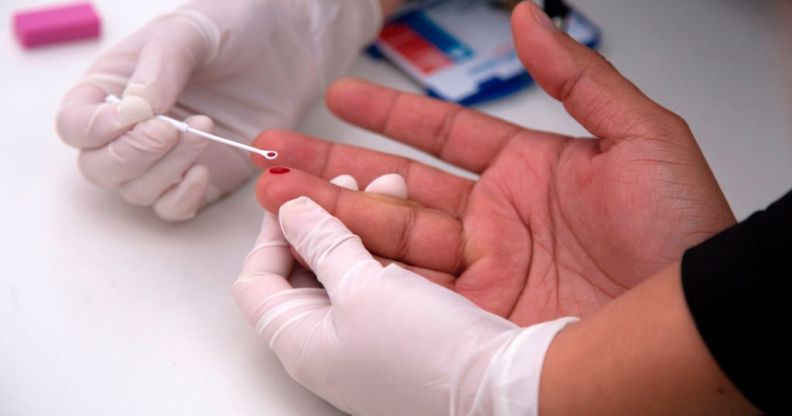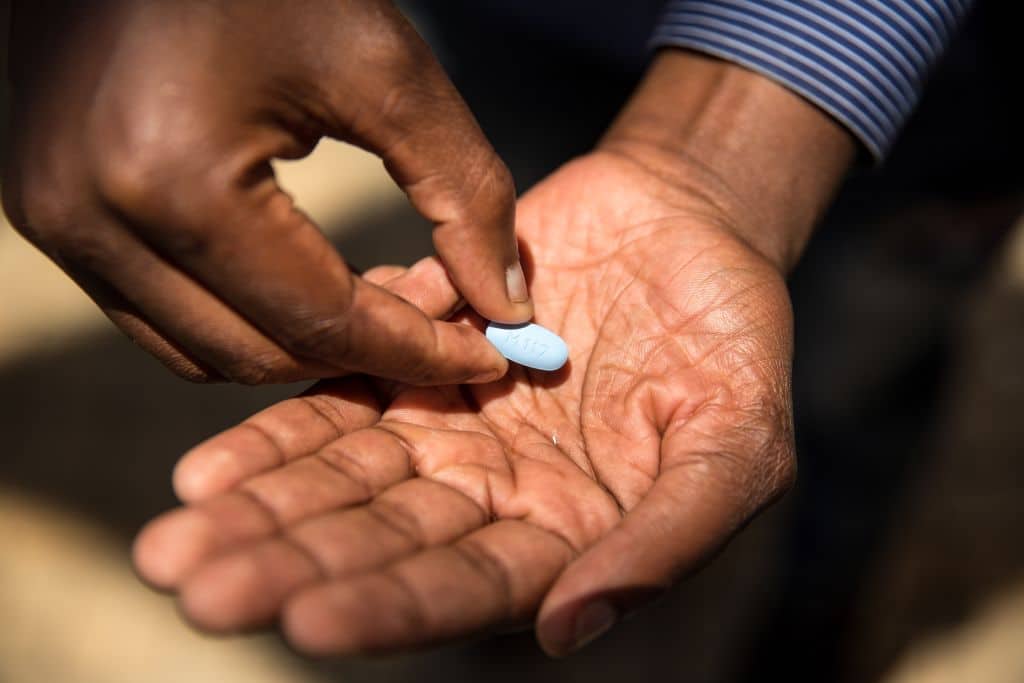Dozens of US states still criminalise HIV transmission. New Jersey is about to break away

A man undergoes a rapid HIV test. (CLAUDIO REYES/AFP via Getty)
New Jersey is set to decriminalise HIV transmission, ending an historic law that “fuels stigma”.
Under current New Jersey law, a person who engages in sexual penetration by any body part without disclosing they are HIV-positive could face up to five years in prison.
For other sexually-transmitted infections, the sentence is limited to 18 months.
On Monday (10 January), state senators voted 26-11 to pass a bill, S-3707, that would put an end to this.
The bill would still criminalise the transmission of non-airborne infectious or communicable diseases, but will no longer target those living with HIV or STIs.
“This legislation is a step in the right direction [to] removing the stigmatisation that surrounds individuals living with HIV,” said Senate majority leader Teresa Ruiz, one of the bill’s co-sponsors.
“The criminal code is meant to punish actions that harm others, not discriminate against people living with a chronic health condition.”

New Jersey state senator Teresa Ruiz speaks at the 25th Anniversary of Kid Witness News. (Paul Zimmerman/Getty Images for Kid Witness News)
Co-sponsor senator Joe Vitale said the bill would bring New Jersey in line with “what we now know about the transmissions of certain diseases, especially in light of the advances in treatment”.
It’s a law that has been a “huge priority” for activists, he said.
“I am thankful to the advocates who brought this issue to our attention, not only for leading the way on solid public health policy,” Vitale added, “but also in serving those in need in New Jersey.”
‘Criminalisation does not prevent HIV transmission’
Even activists across the pond celebrated the news, who said that such laws are based on long-outdated conceptions of what HIV is and deepen animosity.
Matthew Hodson, a British HIV activist and executive director for NAM aidsmap, which monitors HIV criminalisation law, told PinkNews: “Criminalisation of HIV creates barriers to HIV testing and treatment, which only serves to increase opportunities for HIV to be transmitted.
“Criminalisation does not prevent HIV transmission.
“There is a shameful history of such laws being used against people in cases where not only has HIV not been passed on but there was no actual possibility of HIV being passed on.
“Criminalisation fuels stigma and is often used against those who are already marginalised or vulnerable, including against LGBT people in countries with state-sanctioned homophobia.
“It is encouraging that several states in the US have recently updated or repealed their legislation relating to HIV criminalisation and that president Joe Biden has spoken out against such laws.”
A history of the US criminalising the transmission of HIV
At least 35 US states, many in the Midwest and Deep South – still have laws on the books that criminalise “HIV exposure”, according to the Centers for Disease Control and Prevention.
A 2017 analysis of 393 HIV-related convictions in Arkansas, Florida, Louisiana, Michigan, Missouri and Tennessee found the average sentence was nearly eight years in prison for having sex without first informing their partner of their status.
In Arkansas, ‘intentional HIV exposure’ carries a minimum of six years and a maximum of 30 years alongside thousands of dollars in fines.
People convicted of ‘intentional exposure’ in South Dakota and Louisiana are also required to register as sex offenders, the Center for HIV Law and Policy says.
Ohio and Tennessee enforce this requirement regardless of intentionality, while in Arkansas it is not a statutory requirement but a court may order it.

A man holding a PrEP tablet. (Daniel Born/The Times/Gallo Images/Getty)
At least six states even have laws that enhance sentences for sexual offences if the person convicted is living with HIV, the Movement Advancement Project found.
The Movement Advancement Project said nearly three in every 10 LGBT+ people live in a state with such outdated law in place. Such laws are often used to punish people who have done no harm, the American Academy of HIV Medicine has warned.
Michigan, for example, exempts those living with HIV who have sex without disclosing their status as long as they are on viral suppression medication.
Both the HIV Medicine Association and the Infectious Diseases Society of America have urged state legislators to peel back such laws, calling them “unjust and harmful”.
Many states scrambled to roll out laws criminalising people living with HIV amid the paranoia of the early HIV epidemic, when acquiring the virus was considered a death sentence.
Now, things have changed, to say the least. Scientists know so much more about the virus and how it spreads, and great leaps in antiretroviral treatments mean that those living with HIV live long, healthy and happy lives.
Science in no way supports laws that single out people living with HIV, and activists have argued that these laws are tinged with racism and transphobia.
People living with HIV are more likely to be trans, Black and Latinx, meaning that they are disproportionately targeted by the laws, Lambda Legal and Injustice Watch have found. Some prosecutors even weaponise hateful stereotypes of these demographics to justify the charges.
If New Jersey repeals its law, it would join Illinois and Texas in throwing out entirely their HIV-specific criminal laws.
Missouri, California, Iowa, North Carolina, Nevada, Virginia and Michigan, meanwhile, have all softened their anti-HIV laws since 2014, according to the CDC.

